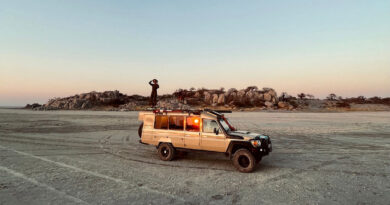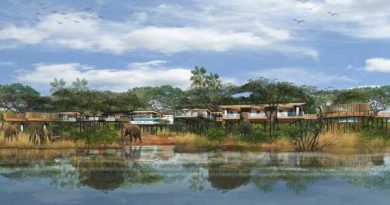African officials credit US for tourism rebound: Travel Weekly
With new flights on the horizon, an overhaul of traditional seasonality and improved traveler confidence, the future for Africa’s travel and tourism industry is looking up. This is in part thanks to American travelers, which African tourism has highlighted as one of the top three source markets leading the continent’s recovery.
During a presentation at WTM Africa at the beginning of April, Luis Millan, head of research at ForwardKeys, explained that African tourism is driven mainly by long-haul travel, listing the source markets currently leading the recovery as France, the U.S. and the U.K.
For South Africa, specifically, Millan pointed out that there has been a marked increase in interest from U.S. travelers wanting to visit the country. Flight searches from the U.S. for South Africa increased significantly between January and February. “By identifying travel trends in real-time, destinations can identify incredible opportunities, said Millan.
Delta Air Lines certainly tapped into the available opportunities. The airline announced it would start flying to Cape Town soon after its application to fly between Atlanta and Cape Town — via Johannesburg — was finally approved this month by South Africa’s government.
The airline, in collaboration with Africa travel expert Giltedge, recently hosted U.S. trade partners on an exclusive “Relaunch South Africa” itinerary. The familiarization trip was created in direct response to U.S. travelers’ increasing demand and interest in booking vacations to South Africa. According to Giltedge co-owner and director Murray Gardiner, the U.S. is currently positioned to be South Africa’s leading inbound international market for 2022, with even more growth on the horizon.
Welcome news from Delta
The news of Delta’s new flight is the first sign of that growth, according to Giltedge’s other co-owner and director, Sean Kritzinger. He said: “This is an important decision for Southern Africa tourism numbers, job creation and righting the balance after two years of Covid and the resulting drop in numbers. We are seeing massive demand from the USA for our destinations due to diversity of wildlife, natural beauty, incredible lodges and hotels and related service, world-class cuisine and, of course, wines at a fraction of the price of our competing countries. Well done, Delta Air Lines!”
• Related: A giant step for Africa tourism
Marcelo Novais, general manager for North America at Ker & Downey Africa, added the convenience of not needing to connect via different airports or stay overnight in other destinations minimizes travel time, which is especially attractive for U.S. travelers wanting to visit South Africa.
Delta will join United in offering nonstop service to South Africa. United operates a nonstop service between Newark and Cape Town three times per week and also flies five times weekly between Newark and Johannesburg. The airline has also reportedly applied for direct flights between Washington Dulles and Cape Town, a service it hopes to launch in November.
“With both United Airlines and Delta offering direct flights from different regions in the U.S., it is clear that there is a very high demand for these routes, and we are seeing more and more U.S. travelers in Cape Town all year round,” he said.
Onne Vegter, managing director of Wild Wings Safaris, agreed, saying that the approval of the new route by Delta will immediately show dividends in terms of U.S. arrivals and tourism spend. He said: “It is likely to encourage more U.S. travelers to combine an African safari with other top local destinations, such as Cape Town and the Garden Route. The U.S. remains one of our most important and highest-spending source markets, and easy air access is critical to maximize the potential of this key market. The timing is perfect, as we have seen a strong increase in demand from the U.S. market over the last month or two.”
And end to low-season issues?
According to Vegter, the approval of the Delta route might also help overcome some of the seasonality challenges faced by coastal destinations, which peak over summer. He said: “Safari destinations such as the greater Kruger National Park, Madikwe, Kgalagadi and elsewhere are most popular during the dry winter months, which is low season for the Western Cape and Garden Route. Combining destinations with different seasons on the same itinerary is the best way to combat seasonality, and we expect to see more of that happening.”
Vegter pointed out that the traditional low season (with lower pricing) is getting shorter and shorter. He said: “This is why there is honestly no “best time” to visit South Africa for a U.S. traveler. South Africa is an all-year destination. In summer, there is excellent birding, wine tasting, beach weather, kite surfing, baby animals and lush green vegetation in our Lowveld game reserves. In winter, there is excellent game viewing up north during the dry season; good whale watching and shark cage diving; and a chance to experience Cape Town without the crowds.”
• The Folo podcast: Peter Greenberg shares stories from his “Royal Tour” of Tanzania
The change in “seasonality” is likely short-lived, however, according to Ker & Downey’s Novais. “This year is an exception, because everyone is very eager to travel. Travelers from the U.S. have never really been “last-minute” clients; they usually plan their travels quite far ahead, particularly when they are traveling to Africa. This year, however, many are booking on short notice, which is not normal, but I think this is an exclusively 2022 trend due to the eagerness to travel after the pandemic,” he said.
Across the border, Kate Powell, general manager of marketing at Zambezi Queen Collection, has seen a similar trend with shorter lead times and last-minute bookings. However, she also doesn’t foresee seasonality being a thing of the past.
This sentiment is echoed by Jim Holden, president of Holden Safaris, who says those that can are eager to get out traveling again, as soon as they can, irrespective of seasonality.
He concluded: “Americans have been conditioned to always ask, ‘When is the best time to take a safari?’
“This is driven by the Americans upbringing to always look for the ‘best deal,’ whether buying a car or waiting for shop sales, coupled with ‘the best experience.’ I explain that the best time for a safari is when it suits the particular client’s expectations, and where in Africa they might want to go on safari, pointing out that a safari can be experienced anywhere between Cape Town and Cairo, a straight-line distance of around 6,500 miles, with different weather systems and safari experiences.”
Source: Read Full Article



